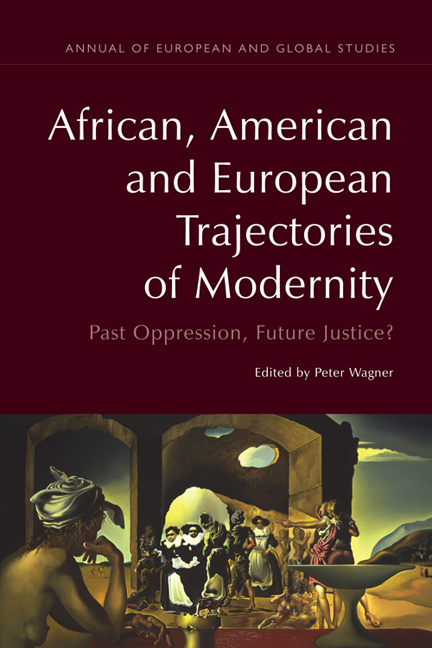Book contents
- Frontmatter
- Contents
- List of Figures
- Introduction
- Part I Reconstructing the History of Atlantic Modernity
- Part II Comparing Trajectories of Modernity in the South
- 6 Inconsistencies between Social-democratic Discourses and Neo-liberal Institutional Development in Chile and South Africa: a Comparative Analysis of the Post-authoritarian Periods
- 7 7. HIV/AIDS Policies and Modernity in Brazil and South Africa: a Comparative Critical Analysis
- 8 Land and Restitution in Comparative Perspective: Analysing the Evidence of Right to Land for Black Rural Communities in Brazil and South Africa
- Part III Claims for Justice in the History of Modernity and in its Present
- Notes on the Contributors
- Index
8 - Land and Restitution in Comparative Perspective: Analysing the Evidence of Right to Land for Black Rural Communities in Brazil and South Africa
from Part II - Comparing Trajectories of Modernity in the South
Published online by Cambridge University Press: 05 August 2016
- Frontmatter
- Contents
- List of Figures
- Introduction
- Part I Reconstructing the History of Atlantic Modernity
- Part II Comparing Trajectories of Modernity in the South
- 6 Inconsistencies between Social-democratic Discourses and Neo-liberal Institutional Development in Chile and South Africa: a Comparative Analysis of the Post-authoritarian Periods
- 7 7. HIV/AIDS Policies and Modernity in Brazil and South Africa: a Comparative Critical Analysis
- 8 Land and Restitution in Comparative Perspective: Analysing the Evidence of Right to Land for Black Rural Communities in Brazil and South Africa
- Part III Claims for Justice in the History of Modernity and in its Present
- Notes on the Contributors
- Index
Summary
Introduction
SINCE THE OPENING of the process of democratic reconstruction during the 1990s, historical reparation policies have been implemented in Brazil and South Africa to atone for injustices committed by both states against the black population during the previous centuries. In this chapter, we shall debate and compare the legitimised objects linked to the right to land of black rural communities, associated with the reparation policies in these two contexts.
In the Brazilian case, legal recognition of landownership of areas occupied by reminiscences of quilombos (descendants of the slave population) is part of the affirmative action policies adopted by the federal government to combat racial discrimination since the proclamation of the constitution of 1988. These actions have received a great deal of criticism because conservative sectors of society still rely on the myth of racial democracy, aiming at reproducing and sustaining the white, slave-owning, racist and monocultural face of our ‘civilising’ process.
In the South African context, the land restitution programme, aimed at the reparation of injustices committed during the apartheid, is criticised for not having met the goals of transferring 30 per cent of arable land into the hands of black farmers. In the newspapers, the word ‘failure’ is a constant in debates about the dilemma of land reform, aiming at attesting the inability both of the government and of the African National Congress in providing for the country's agricultural development.
Within the field of social theory, several authors have tried to think about historical restitution policies (Fay and James, 2008; Barkan, 2000; Verdery, 2004; De Greiff, 2006). Most of their efforts, however, did not address or, indeed, cross the south–north dichotomy, using the reconstruction of Eastern Europe, the Holocaust and North American indigenous peoples’ reparation as their comparative basis. Nevertheless, over the last few years, the issue of ancestral land rights has been widely debated among African and Latin American researchers. The recent studies on this theme have shown the singular ‘orders of worth’, borrowing terminology from Boltanski and Thévenot (1991, originally ‘orders of grandeur’), related to land, that emerge in countries whose historical trajectories differ from occidental contexts.
- Type
- Chapter
- Information
- African, American and European Trajectories of ModernityPast Oppression, Future Justice?, pp. 174 - 194Publisher: Edinburgh University PressPrint publication year: 2015

